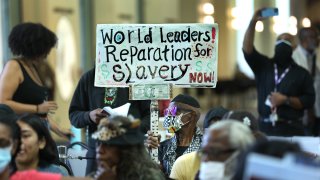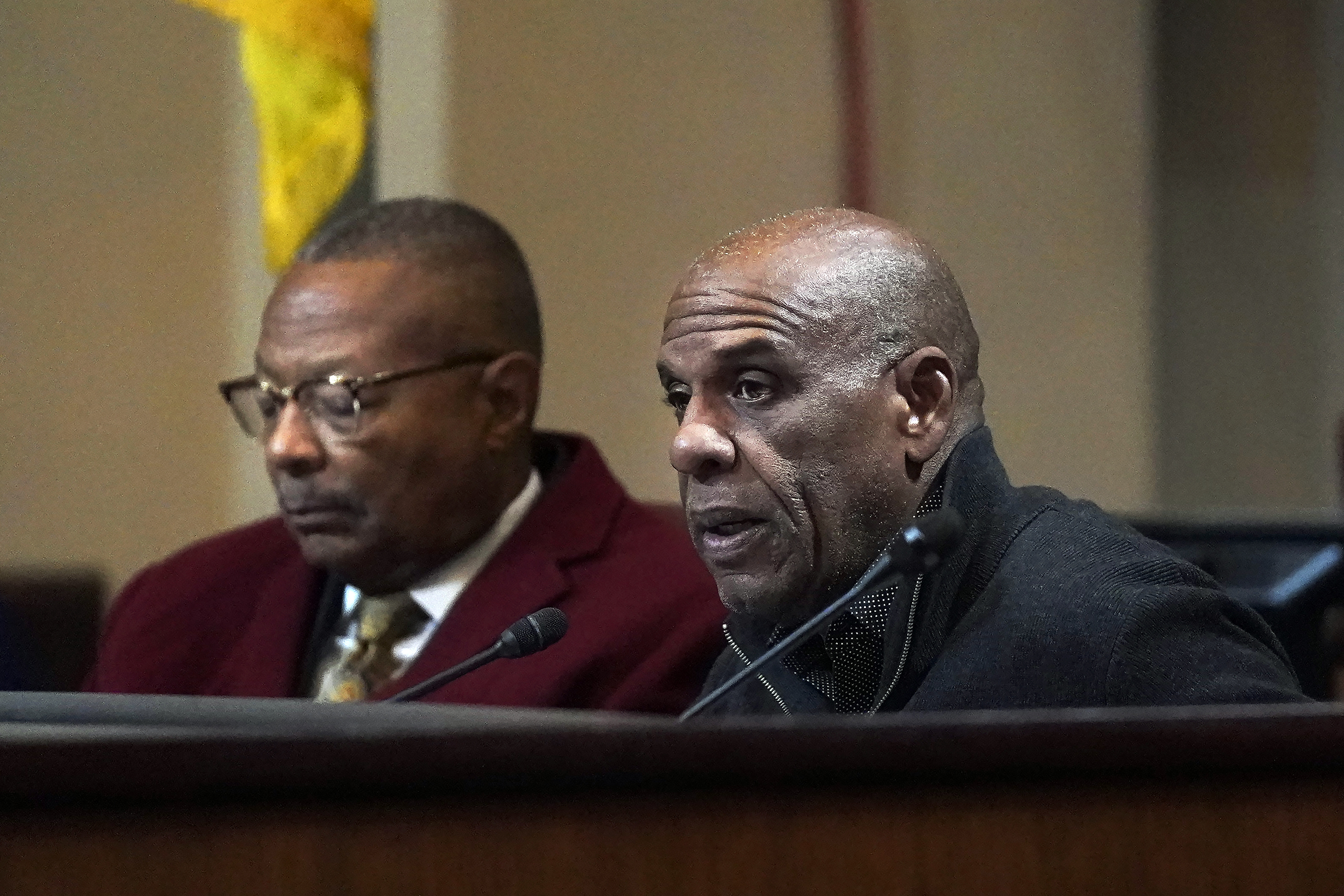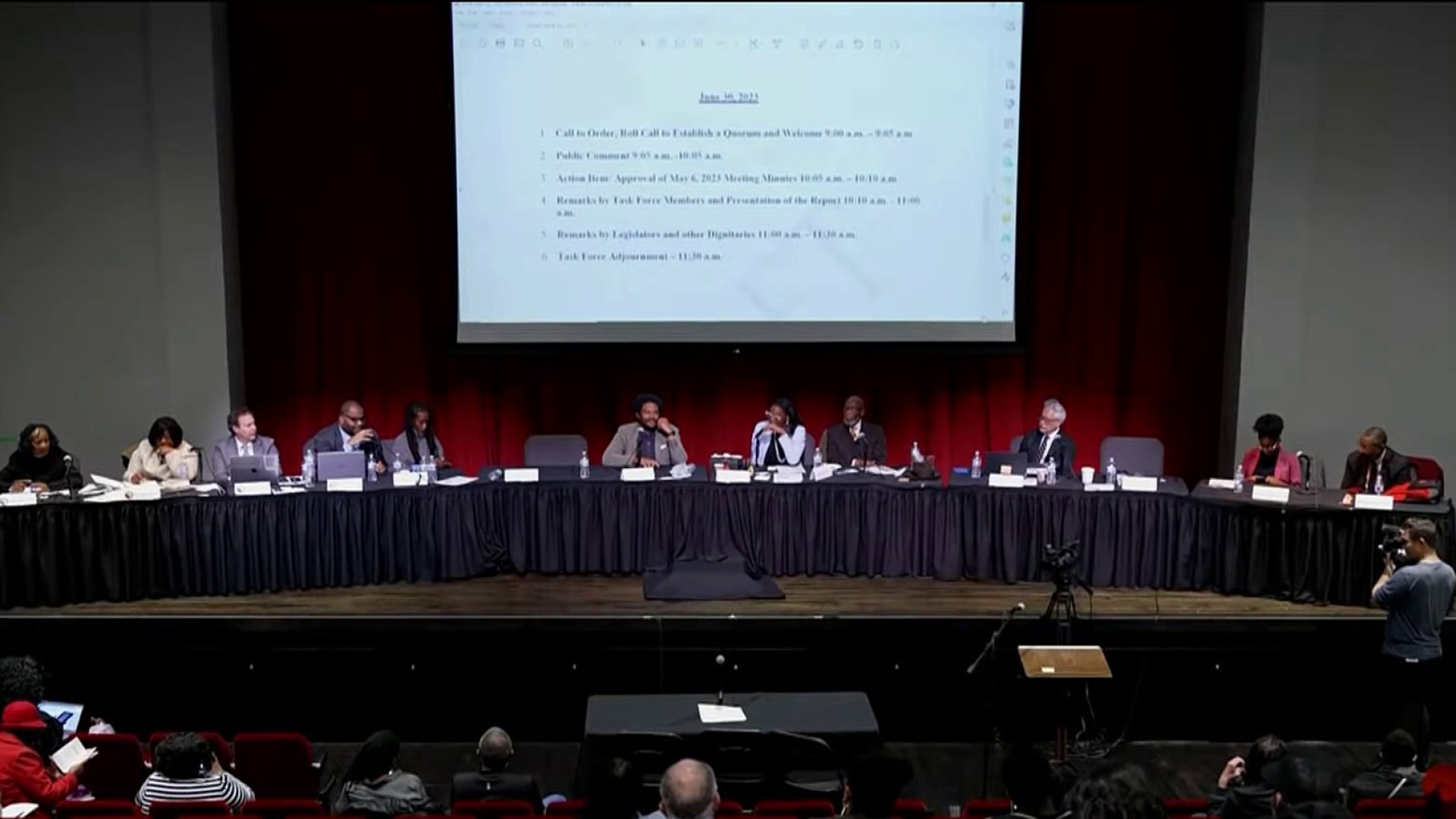
What to Know
- The California Reparations Report details the state's role in perpetuating discrimination against Black residents and suggests more than 100 ways to repair the harm.
- After two years of work, the panel handed off the 1,200-page report to the lawmakers responsible for turning the findings into legislation.
- The task force narrowly voted to limit any financial redress to residents who can document lineage from Black people who were in the U.S. in the 19th century.
Members of California's Black reparations task force presented their historic two-year report to state lawmakers Thursday, challenging critics to read the hefty tome and reconsider redress for the descendants of slavery.
“This book of truth will be a legacy, will be a testament to the full story,” said Lisa Holder, a civil rights attorney and task force member. “Anyone who says that we are colorblind, that we have solved the problem of anti-Black... racism, I challenge you to read this document.”
AB3121: Read the full report
Get Southern California news, weather forecasts and entertainment stories to your inbox. Sign up for NBC LA newsletters.
The first-in-the-nation state slavery reparations panel met one last time Thursday ahead of handing off the 1,200-page report to the lawmakers responsible for turning the findings into legislation. Lawmakers and Gov. Gavin Newsom must agree for any money to be paid or for any policy changes to be adopted.
The report details California's role in perpetuating discrimination against Black residents and suggests more than 100 ways to repair the harm. Ideas range from formally apologizing to paying descendants of enslaved people for having suffered under racist actions such as over-policing and housing discrimination.
"The final report surveys the ongoing and compounding harms experienced by African Americans as a result of slavery and its lingering effects on American society today, and proposes a comprehensive reparations plan in satisfaction of the direction set forth by the Legislature in AB 3121," the panel said.
The panel also recommended creating a new agency to oversee reparations efforts.
Thursday's meeting coincided with the U.S. Supreme Court striking down affirmative action in higher education, programs that have disproportionately helped Black students.
The ruling won't affect public colleges or universities in California because its voters eliminated state and local government affirmative action in 1996. Task force members said their suggestions will pass legal muster because the benefits suggested would only go to descendants of enslaved people, not to all Black residents.
California Secretary of State Shirley Weber, who wrote legislation creating the task force, addressed those who questioned the need for reparations in a state where slavery was never officially sanctioned. She pointed out the wide-ranging harms the task force found that stemmed from slavery’s lingering effects.
“Reparations is due whether you're in Mississippi or you’re in California,” she said. “We have done it for others, but we have not done it for African Americans who have probably suffered the most harm.”
The task force narrowly voted to limit any financial redress to residents who can document lineage from Black people who were in the U.S. in the 19th century.
More than 200 people gathered at the meeting in Sacramento, with an overflow crowd outside the room. Inside, many stood at one point and began a call-and-response to demand action.
“What do we want?” someone shouted.
“Reparations,” the crowd responded.
“When do we want them?” he asked.
“Now!”
Rev. Amos C. Brown, a longtime civil rights activist and vice-chair of the task force, said California’s projected $31.5 billion budget deficit should not stop the state from making reparations.
“This state has committed a crime against Black folks, and it’s time for them to pay,” Brown said to cheers from the audience. “Deficits don’t last always.”
The nine-member reparations panel convened in June 2021, the year after Newsom signed legislation creating the group. Newsom and legislative leaders picked the members, including lawyers, educators, elected officials and civil rights leaders descended from enslaved people.
Federal reparations efforts have stalled for decades, but cities, counties, school districts and universities have taken up the cause. An advisory group in San Francisco recommended that qualifying Black adults receive a $5 million lump-sum, guaranteed annual income of at least $97,000 and personal debt forgiveness. San Francisco supervisors are supposed to take up the proposals later this year.
New York may soon follow in California by creating a commission to examine the state's involvement in slavery and consider addressing present-day economic and educational disparities experienced by Black people. Lawmakers approved the legislation earlier this month, but Gov. Kathy Hochul has yet to sign it.
California entered the union as a free state in 1850, but in practice it sanctioned slavery and approved policies and practices that thwarted Black people from owning homes and starting businesses. Black families were terrorized, their communities aggressively policed and their neighborhoods polluted, according to a groundbreaking report released last year as part of the committee's work.
The panel did not recommend a fixed dollar amount for financial redress, but endorsed economic methodologies to calculate what is owed for decades of overpolicing, disproportionate incarceration and housing discrimination. Initial calculations pegged California's potential cost at more than $800 billion — more than 2.5 times the state's annual budget. The estimated cost was cut to $500 billion in a later report, though no explanation was made about the change.
The panel has recommended prioritizing elders for financial compensation.
Economists recommended nearly $1 million for a 71-year-old Black person who lived all their life in California — or $13,600 per year — for health disparities that shorten the average life span.
Black people subjected to aggressive policing and prosecution in the “war on drugs” from 1971 to 2020 could each receive $115,000 if they lived in California throughout that period, or more than $2,300 for each year.
Kamilah Moore, an intellectual property and entertainment lawyer who led the task force, called the last two years a whirlwind.
“It’s been very work intensive, but also very cathartic and very emotional,” she said. “We’re standing in the shoes of our ancestors to finish, essentially, this sacred project.”



